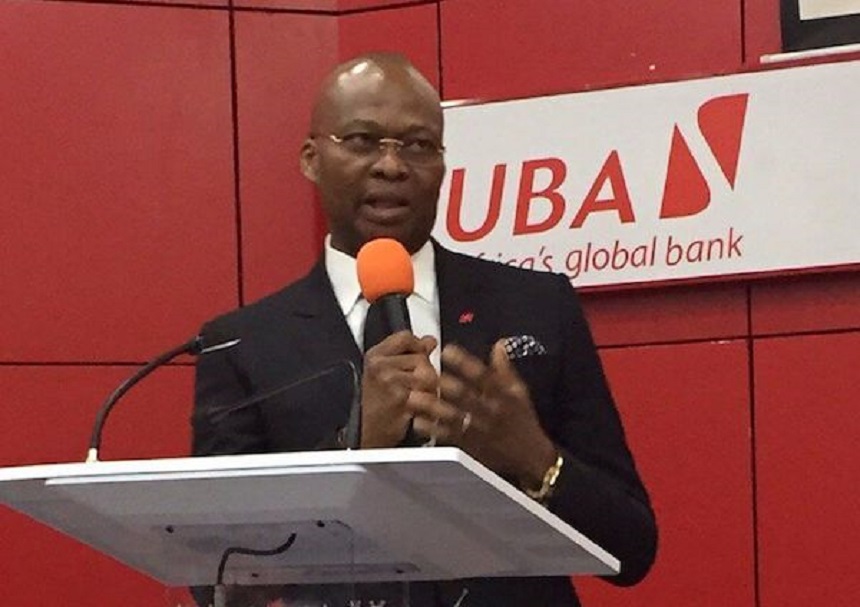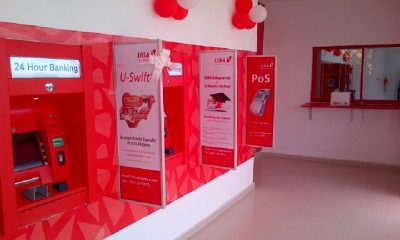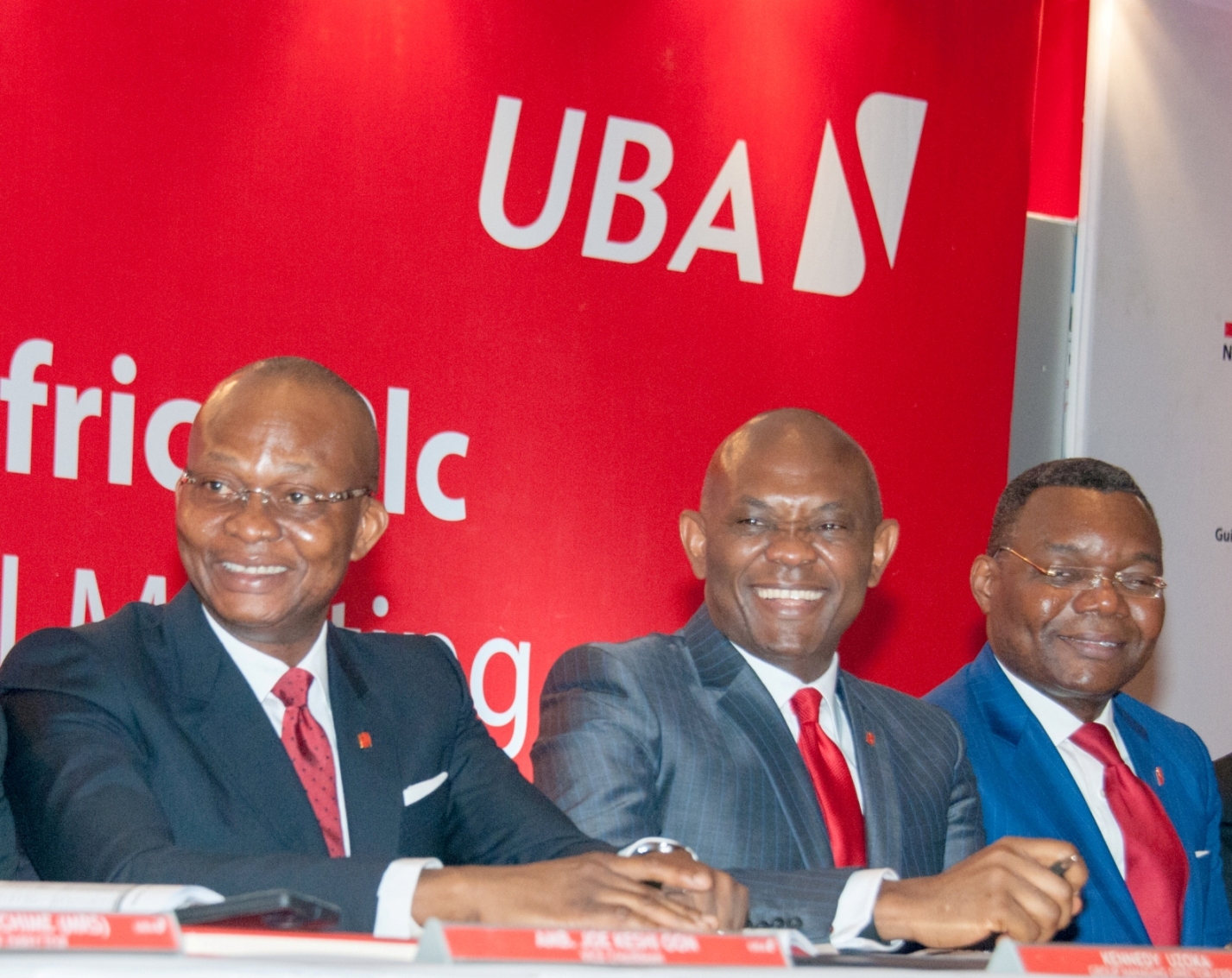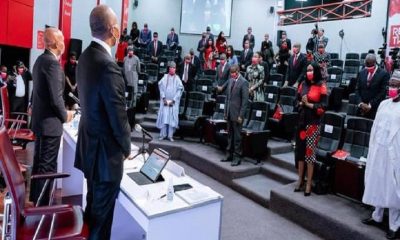Banking
Uzoka Assures UBA Shareholders Superior Long-term Return

By Modupe Gbadeyanka
Shareholders of United Bank for Africa (UBA) Plc have been assured that the bank will continue to give them superior long-term return for their investments in the company.
Chief executive of UBA, Mr Kennedy Uzoka, said that the 2017 financial statements of the lender released yesterday showed that the different strategies put in place by management were yielding the expected results.
In the 2017 earnings released on Friday to the Nigerian Stock Exchange (NSE), UBA showed significant growth in the contribution and market share from its pan-African subsidiaries, among other positive trends in the financial performance.
The pan-African financial institution’s audited results showed that gross earnings grew substantially to N462 billion, up by 20 percent from N314 billion recorded in the corresponding period of 2017.
The Group also delivered a strong 16 percent year-on-year growth in profit before tax of N105 billion, compared to N90.6 billion in the 2016 financial year.
Also, the Profit After Tax leaped to N78.6 billion, an 8.8 percent year-on-year growth compared to N72.3 billion in 2016.
It was observed that the bank’s subsidiaries outside Nigeria contributed a third of the Group’s top-line and 45 percent of the profit for the year, a remarkable improvement from 31 percent contribution made by the ex-Nigeria offices in 2016.
This, according to market analysts, affirms the success of the lender’s expansion strategy, with target of 50 percent contributions by 2020.
UBA’s Operating Income grew to N326.6 billion, a 20.6 percent increase compared to N270.9 billion recorded in 2016. This, according to analysts, affirms the capacity of the Group to deliver strong performance through varying economic cycles and challenging business environment.
The audited results also showed that the bank’s Total Assets peaked at N4.07 trillion, translating into 16.1 percent year-on-year growth from the figure of N3.50 trillion recorded as at 2016 financial year.
In the 2017 financial year, UBA’s net loans achieved a prudent 9.7 percent growth at N1.65 trillion, while the customer deposits grew to N2.73 trillion, representing 10 percent YoY growth on N2.49 trillion recorded in 2016 financial year.
Reflecting a strong internal capital generation, the bank’s shareholders’ fund also soared 18.2 percent to N529.4 billion in the 2017 financial year.
Subject to the approvals of the shareholders, the Board of UBA Plc proposed a final dividend of 65 kobo per every share of 50 kobo each. This final dividend proposal is in addition to the 20 kobo per share interim dividend paid after the audit of the 2017 half year financial statements, thus putting the total dividend for 2017 financial year at 85 kobo per share.
Commenting on the result, Mr Uzoka said, “The results, underlines the success of our strategy of expanding across Africa, diversifying revenues and capturing the broader business opportunities inherent in Africa’s growth.
“The results reinforce the sustainability of our business model and the capacity to deliver superior long-term return to shareholders as the economic and business environment improve.”
He said further that, “In 2017, we made strong progress in our strategic initiative of dominating transaction banking across all our countries of operation, gaining market share in all lines of our business.
“Even as the non-oil sectors of our largest country of operation, Nigeria, remained relatively weak, we still grew earnings by 20% to N462 billion, a third of which is attributable to non-funded income.”
Also speaking on UBA’s financial performance and position, the Group Chief Finance Officer(GCFO), Mr Ugo Nwaghodoh, stated that, “In a period of high interest rates, we achieved a relatively low 3.7% cost of funds. This operational efficiency reflects the benefit of our rich pool of stable savings and current account deposits.
“The net interest margin stabilized at 7 percent, even as yields on treasury assets dropped in the last quarter of 2017. Our core transaction banking offerings gained strong momentum, with income from these business lines growing by double digits.”
“We remain committed to our responsible approach to balance sheet management, with focus on growing risk asset and broader balance sheet in a profitable and prudent manner.
“Amidst a subdued Nigerian credit market, we grew our loan portfolio by 10 percent, leveraging our robust liquidity and capitalization to support good businesses through this challenging economic cycle.
“We closed the year with a Basel II capital adequacy ratio of 19 percent and a liquidity ratio of 50 percent, well ahead of 15 percent and 30 percent regulatory requirement respectively.
“Our disciplined approach to lending and broader risk management continues to uphold our asset quality.”
Apart from the strong financial performance in 2017, UBA Group proved its leadership on the continent as the Banker Magazine crowned the Group, ‘African Bank of the Year 2017.’
To further demonstrate the group’s strength and dominance in the financial sector on the continent, four of UBA Group’s operations in Africa also led contenders in their respective countries to emerge the Best Bank of the Year 2017 in their respective markets.
UBA Congo, UBA Tchad, UBA Gabon and UBA Senegal emerged the Best Bank of the Year in Congo, Tchad, Gabon and Senegal, reinforcing the strong franchise of the Group across its chosen markets in Africa.
United Bank for Africa Plc is a leading financial services group in sub-Saharan Africa, with presence in 19 African countries, as well as the United Kingdom, the United States of America and France.
From a single country operation founded in 1949 in Nigeria, Africa’s largest economy, UBA has emerged as a pan-African provider of banking and other financial services, to c.10 million customers globally, through one of the most diverse service channels in sub-Sahara Africa; 632 business offices, 1,750 ATMs, some 13,500 PoS, and a robust online and mobile banking platform.
UBA was the first Nigerian bank to make an Initial Public Offering (IPO), following its listing on the NSE in 1970.
It was also the first Nigerian bank to issue Global Depository Receipts (GDRs). The shares of UBA are publicly traded on NSE and the lender has a well-diversified shareholder base, including foreign and local institutional investors as well as individual shareholders.
Banking
All Set for Second HerFidelity Apprenticeship Programme

By Modupe Gbadeyanka
Registration for the second HerFidelity Apprenticeship Programme (HAP 2.0) organised by Fidelity Bank Plc has commenced.
The Divisional Head of Product Development at Fidelity Bank, Mr Osita Ede, informed newsmen that the initiative was designed to empower women with sustainable entrepreneurship skills.
The lender created the flagship women-empowerment initiative to equip women with practical, income‑generating skills and structured pathways to entrepreneurship.
“HerFidelity Apprenticeship Programme 2.0 reflects our commitment to continuous improvement. Having evaluated feedback from the first edition, we have returned with stronger partnerships and deeper mentorship programmes to ensure that women acquire not just skills, but sustainable economic opportunities,” he said.
“At the heart of the programme is guided, real‑world learning. Participants will undergo intensive apprenticeship training under reputable institutions and industry experts across select fields such as hair styling, shoe making, auto mechatronics, and interior decoration,” Mr Ede added.
He noted that HerFidelity Apprenticeship Programme 2.0 goes beyond skills acquisition by offering participants a wide range of business advisory services. These include business and financial literacy training, mentorship support throughout the apprenticeship journey, access to Fidelity Bank’s women‑focused and SME financial solutions, as well as guidance on business formalisation and growth strategies.
Further emphasising the bank’s vision, Mr Ede said, “By integrating structured mentorship with entrepreneurial development, Fidelity Bank is positioning women not just as trainees, but as future employers, innovators, and economic contributors within their communities. This aligns with our mandate to help individuals grow, businesses thrive, and economies prosper.”
Banking
The Alternative Bank Opens New Branch in Ondo

By Modupe Gbadeyanka
A new branch of The Alternative Bank (AltBank) has been opened in Ondo State as part of the expansion drive of the financial institution.
A statement from the company disclosed that the new branch would support export-oriented agribusinesses through Letters of Credit and commodity-backed trade finance, ensuring that local producers can scale beyond state borders.
For SMEs, the bank is introducing robust payment rails, asset financing for equipment and inventory, and supply chain-backed facilities that strengthen working capital without trapping businesses in interest-based debt cycles.
The Governor of Ondo State, Mr Lucky Aiyedatiwa, represented by his Chief of
Staff, Mr Olusegun Omojuwa, at the commissioning of the branch, underscored the importance of financial institutions in economic development.
“The pivotal role of financial institutions to economic growth and development of any economy cannot be overemphasised. It provides access to capital, supporting small and medium-scale enterprises and encouraging savings.
“Therefore, I have no doubt in my mind that the presence of The Alternative Bank in Ondo State will deepen financial services, create employment opportunities and stimulate economic activities across various sectors,” he said.
In her remarks, the Executive Director for Commercial and Institutional Banking (Lagos and South West) at The Alternative Bank, Mrs Korede Demola-Adeniyi, commended the state government’s leadership and outlined the lender’s long-term vision for Ondo State.
“As Ondo State steps into its next fifty years, and into the future anchored on the sustainable development championed during the recent anniversary celebrations, The Alternative Bank is here to be the financial engine for that vision. We didn’t come to Akure to hang banners. We came to fund work, farms, shops, and factories.”
With Ondo State’s economy anchored largely on agriculture, particularly cocoa production, poultry farming, and other cash crops, alongside a growing SME and trade ecosystem, AltBank is deploying sector-specific financing solutions tailored to these strengths.
For cocoa aggregators, processors and poultry operators, the bank will provide production financing, facility expansion support, machinery lease structures, and structured trade facilities under its joint venture and cost-plus financing models, with transaction cycles of up to 180 days for commodity trades and longer-term structured asset financing for equipment and infrastructure.
The organisation is a notable national non-interest bank with a physical network now surpassing 170 locations, deploying capital to solve real-world challenges through initiatives such as the Mata Zalla project, which saw to the training of hundreds of women as electric tricycle drivers and mechanics.
Banking
Recapitalisation: 20 Nigerian Banks Now Fully Compliant—Cardoso

By Adedapo Adesanya
The Governor of the Central Bank of Nigeria (CBN), Mr Yemi Cardoso, announced on Tuesday that the country’s banking sector is making strong progress in the recapitalisation drive, with 20 banks now fully compliant.
Mr Cardoso disclosed this during a press conference at the first Monetary Policy Committee (MPC) meeting of 2026, where he also highlighted positive developments in the nation’s foreign reserves.
On March 28, 2024, the apex bank announced an increase in the minimum capital requirements for commercial banks with international licences to N500 billion.
National and regional financial institutions’ capital bases were pegged at N200 billion and N50 billion, respectively.
Also, CBN raised the merchant bank minimum capital requirement to N50 billion for national licence holders.
The banking regulator said the new capital base for national and regional non-interest banks is N20 billion and N10 billion, respectively.
To meet the minimum capital requirements, CBN advised banks to consider the injection of “fresh equity capital through private placements, rights issue and/or offer for subscription”.
Following the development, several banks announced plans to raise funds through share and bond issuances.
In January, Zenith Bank said it had raised N350.46 billion through rights issue and public offer to meet the CBN minimum capital requirement.
Guaranty Trust Holding Company Plc (GTCO), on July 4, said it had successfully priced its fully marketed offering on the London Stock Exchange (LSE).
In September, the CBN governor said 14 banks fully met their recapitalisation requirements — up from eight banks in July.
With one month to the central bank’s March 31, 2026, recapitalisation deadline, 13 Nigerian lenders are yet to cross the finish line.
Additionally, the governor noted that 33 banks have raised funds as part of the ongoing recapitalisation exercise, signalling robust capital mobilisation across the sector.
He stated that gross foreign reserves have climbed to a 13-year high of $50.4 billion as of mid-February 2026.
-

 Feature/OPED6 years ago
Feature/OPED6 years agoDavos was Different this year
-
Travel/Tourism10 years ago
Lagos Seals Western Lodge Hotel In Ikorodu
-

 Showbiz3 years ago
Showbiz3 years agoEstranged Lover Releases Videos of Empress Njamah Bathing
-

 Banking8 years ago
Banking8 years agoSort Codes of GTBank Branches in Nigeria
-

 Economy3 years ago
Economy3 years agoSubsidy Removal: CNG at N130 Per Litre Cheaper Than Petrol—IPMAN
-

 Banking3 years ago
Banking3 years agoSort Codes of UBA Branches in Nigeria
-

 Banking3 years ago
Banking3 years agoFirst Bank Announces Planned Downtime
-

 Sports3 years ago
Sports3 years agoHighest Paid Nigerian Footballer – How Much Do Nigerian Footballers Earn

















